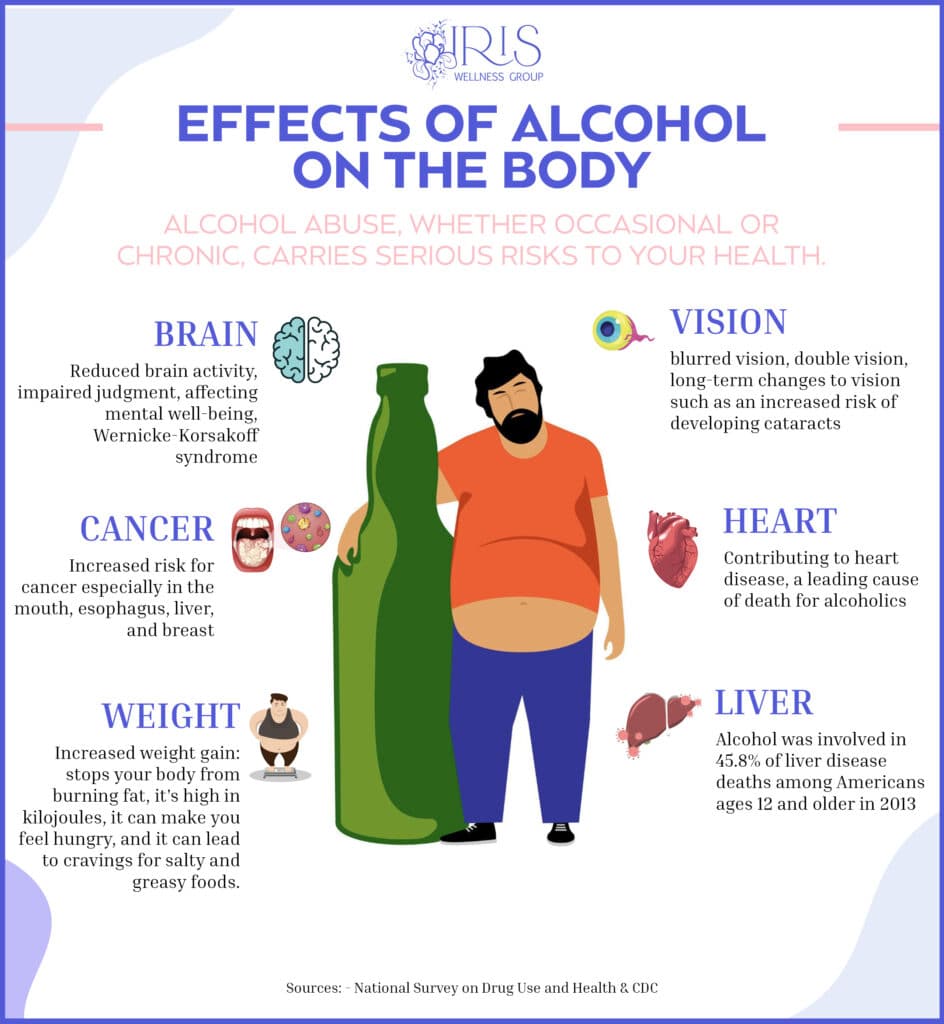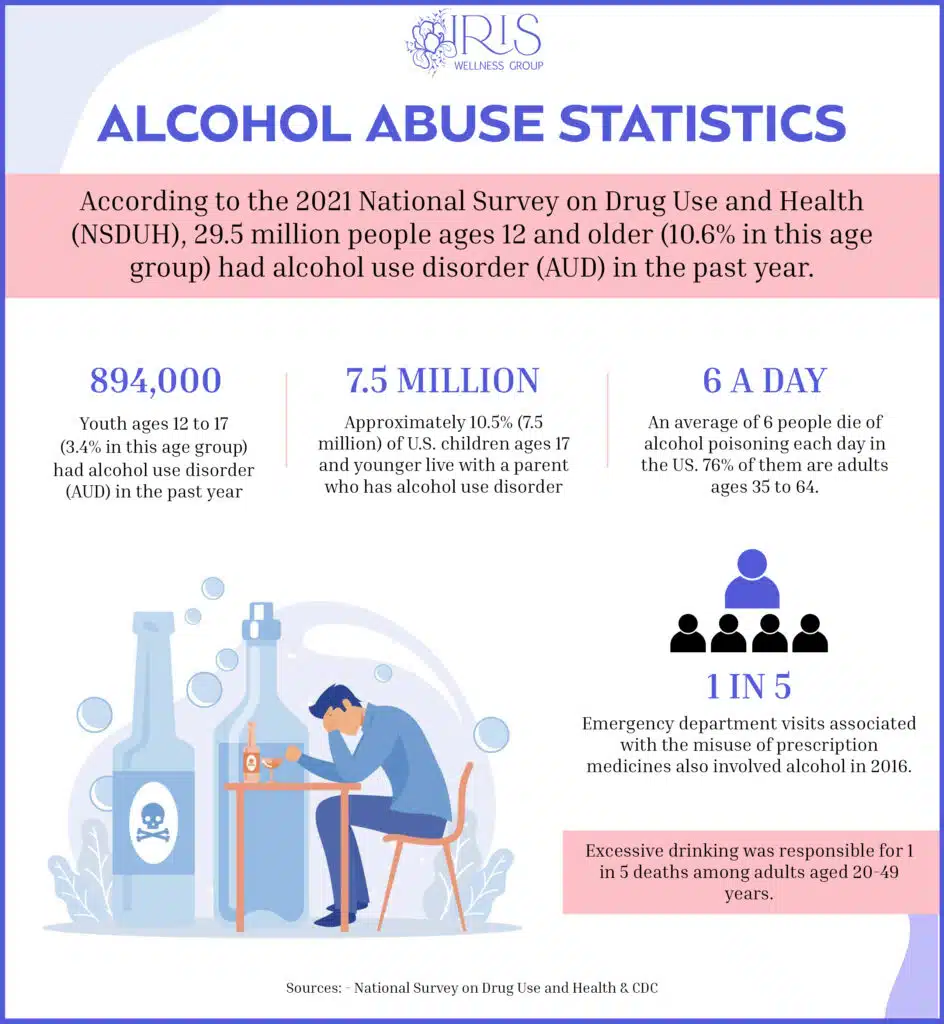
Medically Reviewed By: Dr. Mohsin Ali, MD
Dr. Mohsin Ali MD is board certified in Psychiatry and Child and Adolescent Psychiatry. Trained in Syracuse NY, he has worked in Tennessee for the last sixteen years.
Table of Contents
What is Alcohol Use Disorder (AUD)?
Alcohol addiction, often referred to as alcohol abuse, alcohol dependence, or Alcohol Use Disorder (AUD), represents a complex and chronic brain disease. This disorder extends its impact beyond the individual sufferer, affecting family members and friends as well. Manifesting in various aspects of life, including home, work, and school, AUD creates significant challenges and can make cessation a daunting task.
The 2021 National Survey on Drug Use and Health (NSDUH) revealed that 29.5 million people ages 12 and older (10.6% in this age group) had Alcohol Use Disorder (AUD) in the past year. Among youth aged 12 to 17, the figure was 894,000 (3.4% in this age group).
Alcohol abuse disorder’s impact is further emphasized by a Centers for Disease Control and Prevention (CDC) study, showing an average of 88,000 deaths each year attributed to the condition. It’s a staggering statistic that includes 1 in 10 deaths among working-age adults resulting from excessive drinking, causing 240 American deaths daily from liquor poisoning or alcohol-related diseases.
The CDC defines excessive drinking as having 5 or more drinks in one sitting for men, or 4 or more for women, known as binge drinking. Consuming 15 or more servings of alcohol per week for men, or 8 or more for women, labels you a heavy drinker. Though not necessarily requiring immediate addiction treatment, recognizing and monitoring these drinking habits is crucial to prevent losing control.
Struggling with alcohol addiction is a serious and complex issue, but help is available. Iris Wellness Group is here to support and provide the care needed for yourself or a loved one.
What is Alcohol Addiction?
Alcohol addiction, often referred to as alcoholism, is a chronic disease characterized by an uncontrollable urge to drink alcohol despite its negative effects. It’s like being in a boat caught in a fierce storm, where alcohol seems to be the only anchor. However, this anchor often leads the boat further into the storm.
The Impact of Alcohol Addiction
The effects of alcohol addiction stretch far and wide, impacting not just the individual but also their family, friends, and society. It’s a ripple effect where everyone feels the waves. Health issues, strained relationships, job losses – the list goes on.
Warning Signs of Alcohol Addiction
Alcoholism, a chronic disease characterized by uncontrolled drinking and obsession with alcohol, can manifest in subtle or overt ways. The signs may vary among individuals, but understanding them is key to identifying a problem that requires attention.
Recognizing the Warning Signs of Alcohol Addiction:
- Uncontrolled Alcohol Consumption: One of the early indicators of alcoholism is an inability to control the amount of alcohol consumed. This lack of control often leads to excessive drinking.
- Craving Alcohol: Constant cravings for alcohol, especially when not drinking, can be a sign of dependence.
- Neglecting Personal Responsibilities: Prioritizing alcohol over work, family, or other responsibilities may indicate a problem.
- Feeling the Need to Drink More: Developing a tolerance to alcohol, leading to the need to consume more to achieve the desired effect, can signal addiction.
- Overspending on Alcohol: Spending excessive money on alcohol, even when it strains your finances, reveals a potential issue.
- Behavioral Changes After Drinking: Drastic changes in behavior or personality when under the influence can be concerning.
If you or a loved one exhibits any of these signs, it’s essential to act quickly. Iris Wellness Group offers specialized alcohol addiction treatment in Tennessee to help individuals reclaim control over their lives, call us today.
- Professional Medical Assistance: Our qualified and compassionate team will create a tailored treatment plan to address the unique needs and challenges of each individual.
- Comprehensive Treatment Options: Iris Wellness Group provides a range of therapies, from one-on-one counseling to group sessions, focusing on holistic healing and long-term recovery.
- Support and Guidance: We understand that the journey to sobriety can be challenging. Our committed professionals are here to guide and support you every step of the way.
Symptoms of Alcohol Addiction
Alcoholism is not always easy to identify, especially when drinking is a common social activity. Here’s what to look for if you suspect someone might have an alcohol addiction:
- Increased Quantity or Frequency of Use: Regularly consuming alcohol in larger amounts or more often.
- High Tolerance for Alcohol: Lack of “hangover” symptoms or needing more alcohol to achieve the desired effect.
- Drinking at Inappropriate Times and Places: Consuming alcohol in unlikely places like work or church or at odd times like early mornings.
- Preference for Alcohol-Centric Environments: Avoiding situations where alcohol isn’t present and gravitating towards those where it is.
- Changes in Friendships: Choosing friends who also drink heavily and neglecting former relationships.
- Avoiding Contact with Loved Ones: Withdrawing from family and close friends.
- Hiding Alcohol Consumption: Concealing alcohol or drinking in secrecy.
- Dependence on Alcohol: Relying on alcohol to function in daily life.
- Emotional Changes: Experiencing increased lethargy, depression, or emotional instability.
- Legal or Professional Consequences: Encountering issues like an arrest or job loss due to drinking behavior.
Understanding the subtle signs of alcohol addiction and knowing how to respond can make all the difference in someone’s journey towards recovery. We are available to help individuals and their families navigate the challenges of alcohol addiction in Chattanooga, TN, and surrounding areas.
How Many Drinks is Considered Alcoholism?
The National Institute on Alcohol Abuse and Alcoholism sets forth guidelines on permissible drink quantities by gender.
For men, it’s advised to have no more than four drinks daily and a maximum of 14 drinks weekly. Exceeding these limits increases the risk of alcohol misuse. For women, consuming one drink daily and between three to seven drinks weekly is seen as low-risk.
However, the definition of an alcoholic drink can vary by state. Generally, it embodies 14 grams of pure alcohol, which equals 5 ounces of wine, 12 ounces of beer, 8 to 9 ounces of malt liquor, or 1.5 ounces (a shot) of 80-proof spirits or hard liquor.
If you or a loved one is consistently consuming beyond these guidelines, reach out to our trusted alcohol rehab and alcohol treatment center. Let us help guide your journey to sobriety.
The Effects of Alcohol Abuse
Alcohol abuse, whether occasional or chronic, carries serious risks to your health. Here are the short-term and long-term effects of alcohol abuse:
Short-term Effects of Alcohol Abuse:
Drinking impacts reaction time and coordination, leading to slow reflexes, making activities like driving perilous. Some short-term effects of alcohol abuse include:
- Slow Reaction Time and Poor Reflexes: Compromising safety on the road.
- Reduced Brain Activity: Impairing judgment.
- Lowered Inhibitions: Leading to risky behavior.
- Visual and Respiratory Problems: Such as blurry vision and difficulty breathing.
- Restlessness: : Affecting mental well-being.
Long-term Health Conditions of Alcohol Abuse:
Alcohol’s long-term effects can be severe, lying dormant for years. Some of the long-term effects of alcohol abuse include:
- Brain Defects: : Including Wernicke-Korsakoff syndrome.
- Liver Disease: : Alcohol was involved in 45.8% of liver disease deaths among Americans ages 12 and older in 2013.
- Diabetes Complications: : Aggravating blood sugar control.
- Heart Problems: : Contributing to heart disease, a leading cause of death for alcoholics.
- Increased Risk of Cancer: : Especially in the mouth, esophagus, liver, and breast.
- Vision Damage and Bone Loss: Affecting overall health and wellness.
With an estimated 88,000 annual deaths from alcohol-related causes in the U.S., alcohol abuse is the fourth leading preventable cause of death. It’s essential to recognize that alcohol abuse is treatable.
Our Alcohol addiction treatment center in Tennessee is tailored to address both the short-term and long-term health complications from alcohol abuse, offering hope for those seeking a healthier life away from alcohol.
If you or someone close to you is struggling with the impact of alcohol addiction and abuse, reach out to our alcohol rehab in Chattanooga today. We’re here to help you begin the path to a rejuvenated life.
Understanding Alcohol and Mental Health
There’s a strong tie between drinking and mental health. Studies tell us that people who drink often might face more mental health issues. On the flip side, people who are dealing with serious mental health challenges sometimes turn to alcohol, maybe as a way to cope or ease their pain.
Alcohol and Depression
Consistent heavy drinking can pull you down into feelings of sadness. If you’re feeling blue and decide to cut back on booze, you might notice a lift in spirits after a short while. If you feel better, alcohol might’ve been the culprit behind your gloom. If those down feelings linger, it’s smart to chat with a doctor.
Also, mixing alcohol with antidepressants? Not a great combo. Alcohol can amplify depression and mess with your medication. Some meds even make it trickier to quit drinking.
Alcohol and Anxiety
For people feeling anxious, a drink might offer a brief calm moment. But, that calm vanishes quick. If you lean on alcohol to quiet your worries, you might end up needing more drinks to feel that brief calm. This cycle can spiral into dependence. And hangovers? They can make anxiety spike.
If you’re using drinks to relax, consider alternatives. How about meditation, yoga, jogging, or diving into hobbies?
Alcohol and Psychosis
Too much booze or suddenly stopping after heavy drinking can sometimes lead to psychosis.
Alcohol, Self-Harm, and Suicidal Thoughts
Here’s the thing: alcohol can make you act on a whim, leading to risky behaviors like self-harm. It’s also tied to thoughts of ending one’s life.
If dark thoughts cloud your mind, Iris Wellness Group is always here to chat. If things get really bleak or you harm yourself, don’t hesitate and call 911.
Call Us Today to Start Healing From Your Alcohol Addiction.
Alcohol Addiction and Alcohol Rehab Frequently Asked Questions
How Addictive is Alcohol?
Alcohol’s widely accepted social presence and enjoyable effects can lead to regular consumption and binge drinking. However, the path from social drinking to addiction can be a slippery slope.
Quitting alcohol cold turkey can be dangerous and lead to severe withdrawal symptoms; it’s essential to consult a medical professional before making abrupt changes to alcohol consumption.
Here’s a breakdown of the stages that chronic heavy drinkers may experience, leading to addiction.
Tolerance
Alcohol tolerance develops when an individual requires more alcohol to achieve the same pleasurable effects. As the body becomes accustomed to alcohol, changes in the brain’s chemical balance occur. This adjustment means that moderate amounts of alcohol no longer produce the same level of intoxication, leading to an increase in consumption.
Alcohol Dependence
Alcohol dependence signifies that the body has adapted to alcohol to a point where it becomes essential to maintain chemical balance. The absence of alcohol or reduction in drinking triggers withdrawal symptoms like anxiety, insomnia, discomfort, heart palpitations, confusion, and other dangerous symptoms.
Alcohol Addiction
Alcohol addiction is recognized as an alcohol use disorder (AUD). It goes beyond dependence, affecting the brain’s reward center by influencing natural chemicals like dopamine. Chronic alcohol use conditions the brain to treat alcohol as essential for sustaining life, leading to compulsive drinking even when it causes severe problems.
Alcohol Withdrawal
Unlike some drugs, where withdrawal is merely uncomfortable, alcohol withdrawal can be fatal. The abrupt lack of alcohol in a dependent brain leads to severe alcohol withdrawal symptoms. Alongside physical symptoms, cravings intensify, exacerbating addiction.
What is Alcohol Withdrawal?
Stopping alcohol isn’t like quitting some other drugs. It can be really dangerous. When a person drinks often and then suddenly stops, their body can react strongly, leading to intense cravings and serious symptoms.
When you hear people talk about “alcohol withdrawal” or “AWS”, they’re referring to the tough time your body goes through if you suddenly stop drinking, especially if you’ve been drinking for a long time. It’s like your body gets used to having alcohol around, and it gets upset when it’s suddenly gone.
What are the symptoms of Alcohol Withdrawal?
The way alcohol withdrawal feels can be different for everyone. It depends on things like how often you drink, how much, and your overall health. Some people might just feel a bit off, while others could be in real danger.
Here’s a list of alcohol withdrawal symptoms someone might have:
- Feeling sick or throwing up
- Headaches
- Stomach pains
- Being really tired
- Feeling too hot or cold
- Weird, intense dreams
- Shaky hands or body
- Fast or uneven heartbeat
- Sweating more than usual
- Not wanting to eat
- Feeling sad or super anxious
- Having trouble sleeping
- Rapid mood changes
- Feeling lost or confused
- Getting easily upset or agitated
- Trouble focusing
- A strong desire to drink again.
Alcohol Abuse Statistics
Treatment for Alcohol Addiction at our Chattanooga Alcohol Rehab?
Alcohol addiction treatment is more than just a medical process; it’s a transformative journey. Its role in aiding individuals to grasp the underlying issues of addiction, and providing them with the tools to control and manage these challenges, is vital. It serves as the backbone for achieving and maintaining long-term sobriety, supporting individuals in reclaiming their lives.
Types of Alcohol Addiction Treatment we treat at our Alcohol Rehab in Chattanooga, TN, include the following:
Outpatient Treatment for Alcohol Addiction
Outpatient treatment offers a flexible approach to alcohol addiction recovery, allowing individuals to reside at home while accessing various treatment services. This mode of treatment encompasses:
- Partial Hospitalization (PHP): Ideal for those requiring intensive treatment without the need for round-the-clock care. PHP typically involves 20 or more hours of treatment per week.
- Intensive Outpatient Treatment (IOP): A less intensive option, IOP is suitable for individuals transitioning from inpatient care or those with milder forms of addiction, requiring at least nine hours of treatment weekly.
- Outpatient Alcohol Detox: This option provides a structured yet adaptable detox program, the benefits of outpatient alcohol detox including the ability to maintain daily responsibilities and a supportive home environment, and personalized care tailored to individual needs.
What is Alcohol Addiction Therapy?
Imagine a supportive environment where understanding, compassion, and effective strategies blend together. That’s what therapy for alcohol addiction is all about. It’s not just a place to talk; it’s where transformation begins. Skilled therapists dive deep into the root causes of addiction, helping individuals understand their triggers and develop coping mechanisms.
No two addiction cases are alike; thus, a patient’s treatment program must be tailored. This ensures that the approach aligns with individual needs, focusing on what will be most beneficial. Types of Alcohol Addiction Therapy offered at our Chattanooga Alcohol Rehab include:
- Individual Therapy: One-on-one sessions with a mental health professional allow deep exploration of personal addiction triggers and the development of coping strategies.
- Group Therapy: This fosters a sense of community and empathy, enabling individuals to grow together and learn from shared experiences.
- Family Therapy: Addiction affects the entire family; involving them in therapy can strengthen relationships and support systems.
- Educational Workshops: Empowering through knowledge, these workshops teach essential life skills and coping mechanisms.
- Holistic Therapy: Integrating mindfulness practices, yoga, and meditation enhances mental well-being and physical health.
- Stress Management: Essential in preventing relapse, individuals learn techniques to deal with stress without turning to alcohol.
- Medication–Assisted Treatment: Medications are used to reduce cravings and withdrawal symptoms, aiding in the recovery process.
- Dual Diagnosis Treatment: Addressing co-occurring mental health conditions is essential for comprehensive recovery.
Aftercare Programs
Recovery continues after treatment; aftercare programs for alcohol addiction ensures ongoing success. This includes joining support groups like Alcoholics Anonymous or engaging in treatment center alumni programs. These networks foster a sense of belonging and continuous encouragement.
Detoxification (Detox)
Before the treatment process begins, detoxification is often necessary to cleanse the body of alcohol and toxins. Given the potentially dangerous withdrawal symptoms, professional detox centers provide safe and controlled environments for this critical phase.
Medical Detox for Alcohol Addiction
This phase prepares the body for further treatment, with gradual tapering of alcohol and medical supervision. It’s an essential step towards leaving alcohol behind, allowing the mind to focus on recovery without physical distraction.
Medications in Alcohol Addiction Treatment
Several medications are used to facilitate the treatment process:
- Naltrexone: Reducing alcohol’s rewarding effects, it’s also used in opioid treatment.
- Disulfiram (Antabuse): Deterring alcohol consumption, it triggers unpleasant reactions if alcohol is ingested.
- Topiramate: An anti-epileptic medication showing promise in alcohol treatment.
Alcohol Addiction Counseling in Chattanooga, TN
In the complex and often challenging journey of overcoming alcohol addiction, counseling emerges as a beacon of hope and guidance. It’s more than just a series of sessions; it’s a transformative experience where individuals are empowered to confront and overcome their dependency on alcohol. This process isn’t just about abstaining from alcohol; it’s about fundamentally reshaping how one interacts with life’s myriad challenges, turning away from alcohol as a crutch.
The Benefits of Alcohol Addiction Counseling
- Understanding the ‘Why’: Counseling dives into the ‘why’ behind addiction, helping individuals understand their motivations and triggers.
- Developing Coping Strategies: It’s not just about stopping drinking; it’s about learning how to cope with life’s ups and downs in healthier ways.
- Building a Supportive Network: Counseling connects individuals with support groups and resources, ensuring they’re not walking this path alone.
Is Alcohol Rehab Covered by Insurance?
Navigating the cost of alcohol addiction treatment can be daunting. In 2021, of the 46 million Americans facing Substance Use Disorders, a whopping 94% didn’t get the help they needed. One common myth? That alcohol rehab is financially out of reach. The reality? Many insurance plans either fully or partially cover alcohol rehab costs.
Thanks to the Affordable Care Act, by 2014, new insurance plans had to offer benefits for substance use disorders comparable to regular medical care. This means many policies may cover inpatient and outpatient rehab. Still confused? Most alcohol rehab centers have experts who can help clarify what your insurance covers. Alternatively, directly checking with your insurance provider can give you a clearer picture.
Alcohol Addiction Treatment in Chattanooga, TN
If you or a loved one is struggling with alcohol addiction, it’s essential to seek professional help. Withdrawal from alcohol can be life-threatening, and proper medical care is vital. If you or someone you care about might be suffering from alcoholism, don’t wait for recovery to start. Iris Wellness Group’s alcohol rehab in Chattanooga, TN, can help today.
We’ll meet with you and your family members to honestly assess the situation and develop a personalized path to sobriety. Iris Wellness Group is one of the best alcohol rehab centers in Chattanooga specializing in Alcohol Use Disorder and can work with you immediately.
Alcohol addiction doesn’t have to be a lifelong burden. Recognizing the signs and seeking help early with Iris Wellness Group can significantly enhance your chance of successful recovery. Our expert team is dedicated to helping you kick alcohol addiction to the curb and return to a healthy, fulfilling life. Contact us today to learn more about our alcohol rehab programs in Chattanooga, TN tailored to your needs.
What Is the Treatment for Alcohol Addiction?
Treatment for alcohol addiction typically involves a combination of methods, including detoxification, therapy, medication, and support groups. Detox helps manage withdrawal symptoms under medical supervision. Therapy, such as cognitive-behavioral therapy, addresses underlying behavioral and psychological factors. Medications can reduce cravings and withdrawal symptoms. Support groups like Alcoholics Anonymous (AA) provide a community of peers for ongoing support. The treatment plan is often personalized to fit the individual’s specific needs and circumstances.
Is Alcohol Addictive?
Yes, alcohol is addictive. It affects the brain’s reward system, leading to a dependency that can develop into addiction. Regular consumption can result in tolerance and withdrawal symptoms, hallmark signs of addiction.
Why Is Alcohol Addictive?
Alcohol is addictive because it releases dopamine in the brain, creating a feeling of pleasure or euphoria. Repeated use alters brain chemistry, leading to physical dependence and addiction, as the body craves alcohol to feel normal.
How Is Alcohol Addictive?
Alcohol becomes addictive through its impact on brain chemistry. It alters the balance of neurotransmitters, leading to changes in mood, behavior, and bodily functions. Prolonged use can make these changes more permanent, reinforcing the addiction.
Is Outpatient Alcohol Rehab Effective?
Outpatient alcohol rehab can be effective, particularly for those with less severe addiction, strong support networks, and daily responsibilities they cannot leave. It involves regular therapy sessions while living at home.
How Long is Alcohol Rehab?
The length of alcohol rehab varies, with inpatient programs ranging from 30 days to 90 days or more, and outpatient treatment potentially extending over several months or longer.
What Makes Alcohol Addiction Therapy Effective?
Alcohol addiction therapy is effective because it addresses the underlying causes of addiction, offers personalized strategies for coping, and provides a supportive environment for recovery.
Which Condition Is Often a Result of Alcohol Addiction?
How Long Does It Take to Get Addicted to Alcohol?
The time it takes to develop an addiction to alcohol varies. Factors like genetics, frequency of drinking, and personal circumstances play a role. Some individuals may develop an addiction within months, while for others, it might take years.
Who is Chattanooga Alcohol Rehab Designed For?
Chattanooga alcohol rehab caters to individuals living in Chattanooga, Red Bank, Signal Mountain, Lookout Mountain, Southeastern Tennessee, Northern Georgia, or surrounding areas. These services are ideal for those who do not require medically supervised detoxification, have a stable and supportive home and work environment, and are self-motivated in their journey towards recovery.
Is Alcohol Addiction Genetic?
Genetics can play a significant role in alcohol addiction. Individuals with a family history of addiction are at a higher risk, though environmental factors and personal experiences also contribute significantly to the development of addiction.
How Much Does Alcohol Rehab Cost?
The cost of alcohol rehab varies widely depending on several factors, including the type of program (inpatient or outpatient), the location of the facility, the length of the program, and the amenities offered. Inpatient programs can range from $2,000 to $25,000 for a 30-day program, while outpatient programs may cost less. Some insurance plans cover a portion of the cost, but it’s important to check with your insurance provider for specific coverage details.
What Happens in Alcohol Rehab?
In alcohol rehab, individuals undergo a comprehensive treatment process that typically starts with detoxification to manage withdrawal symptoms. Following detox, the program includes various forms of therapy such as individual counseling, group therapy, and possibly family therapy. Rehab programs also often offer educational sessions about addiction and coping strategies, skill-building workshops, and support group meetings. The goal is to provide the tools and support necessary for long-term recovery and sobriety.
Does Insurance Cover Alcohol Rehab?
Many insurance plans do cover alcohol rehab, but the extent of coverage can vary significantly based on the specific policy and provider. Coverage might include detoxification, inpatient and outpatient treatment programs, therapy, and medication. It’s important to check with your insurance provider to understand what types of treatment are covered, any deductibles or copays that may apply, and if there are any restrictions, such as the need for pre-authorization or limits on the length of treatment. Additionally, some rehabs have staff who can assist with understanding and utilizing your insurance benefits for treatment.











